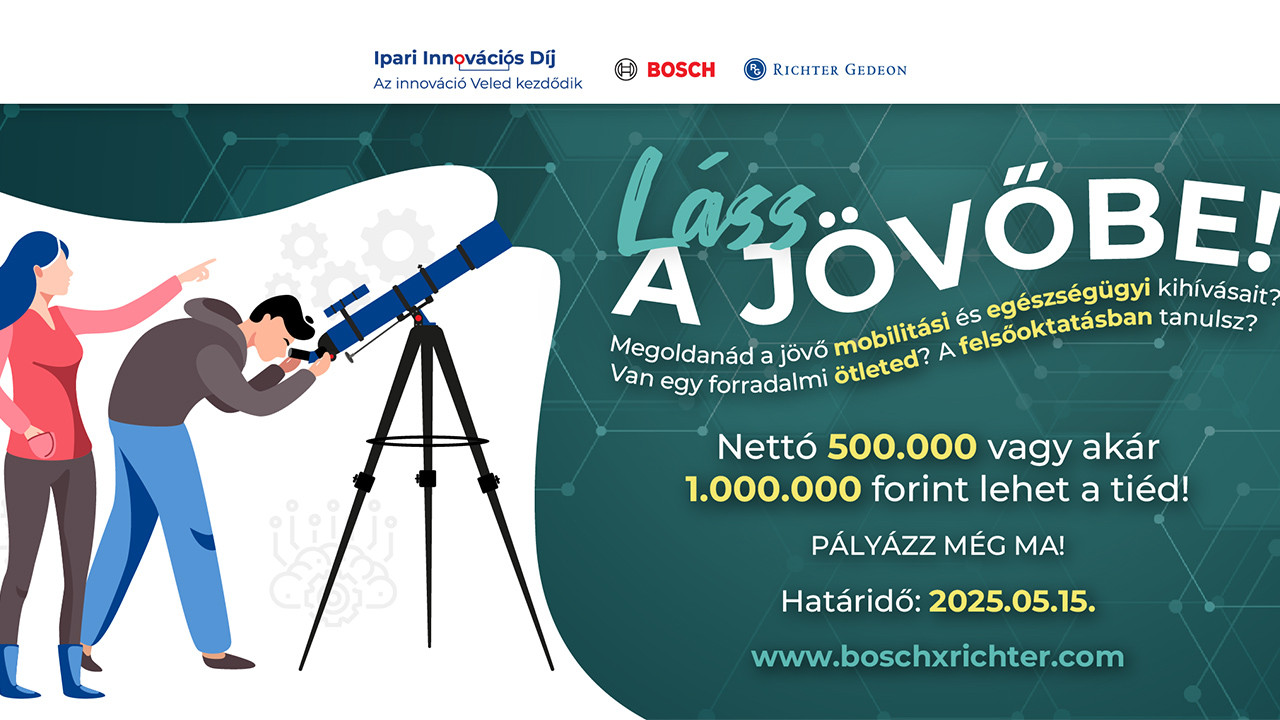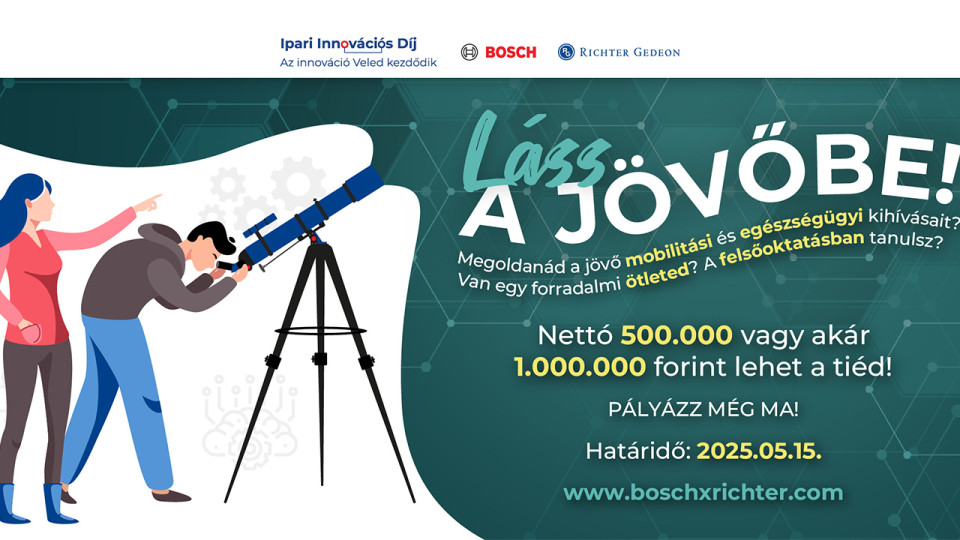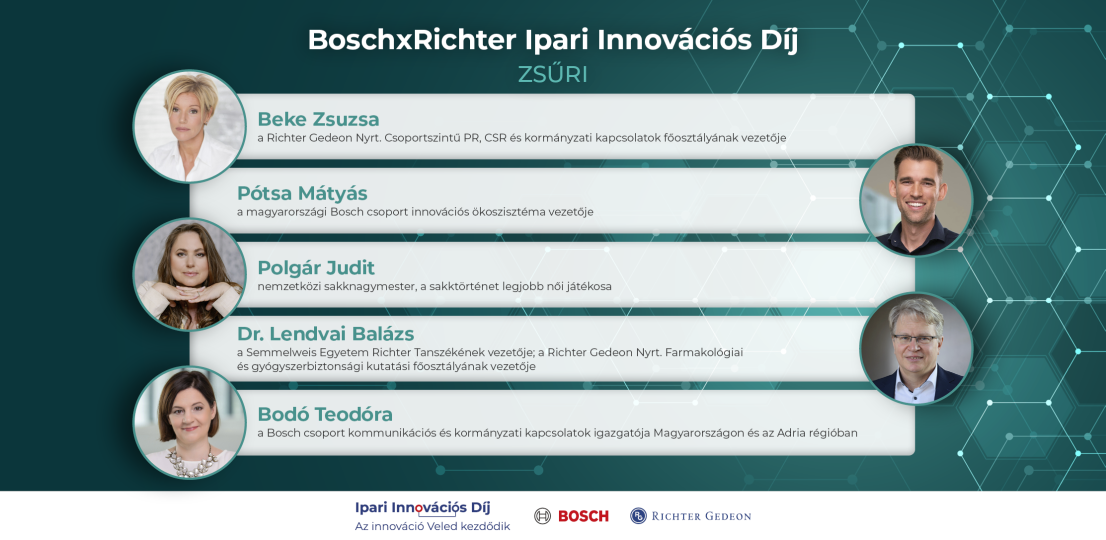The world is already facing many challenges, but the future holds even more crucial choices for all of us. The Bosch Group in Hungary and Gedeon Richter Plc. believe that the fresh outlook and innovative drive of young people can help technology and innovation to successfully answer tomorrow’s questions.
They believe in the future, they trust in innovation
According to a recent poll by Bosch and Richter, Generation Z members expect the biggest leaps forward in practical innovation in medicine and transport. The majority of today’s young people are confident that in the future there will be treatments for diseases for which science has not yet had an answer, and they expect more new treatments to emerge. Many believe that in the future we will have better transport infrastructure and that driverless cars will be a common sight, the survey found.
“See into the future!” – innovation competition for Generation Z
With a focus on young people who are creative and receptive to new solutions, two major companies in Hungary are jointly launching the Bosch×Richter Industrial Innovation Award for the second time, this year under the title “See into the future”. The aim of the competition is to encourage students in higher education in Hungary to identify future challenges in transport and medicine and to find fresh, innovative solutions.
How can pandemics be predicted? Can serious diseases be prevented? How can telemedicine help? What will make cities more liveable? What could be the fuel of the future? How can we make self-driving cars and transport safer? These are just some of the questions that could have a decisive impact on transport and medicine in the next 5-10 years. Students applying for the Bosch×Richter Industrial Innovation Award will have to submit a written application, which should not only address a problem that will shape mobility and healthcare in the future but also develop a practical solution for it. More details on the competition are available at http://www.boschxrichter.hu/.
The deadline for applications from students in higher education is midnight on 15 May 2025 for individual and team categories in either the healthcare or mobility field. Winning individual applicants will receive a net prize of 1 million forints, and teams of up to three will receive a net prize of 500 thousand forints per team member. The winners will be able to present their entries at the Bosch×Richter Innovators’ Day in September 2025.
The key to the future: recognising the trend in today’s uncertainty
The winners of last year’s inaugural Bosch×Richter Industrial Innovation Awards brought exciting and sustainable solutions to tackle dementia, extend self-driving technology and tackle the problems of urban heat.
“Despite the uncertainty that surrounds us, the key to progress is to identify future trends early and base our developments on them. We would like to encourage young people to use their creative ideas and cooperate with us for tomorrow,” said Teodóra Bodó, director of Communications and Governmental Relations of the Bosch Group in Hungary and the Adriatic region.
“Young people’s ideas can have a significant inspirational impact on society, and the Bosch×Richter joint prize gives us the opportunity to help realise them with financial support and mentoring, as well as with corporate know-how,” added Zsuzsa Beke, head of global communication, CSR and public affairs at Gedeon Richter Plc.
This year, the winning entries will once again be decided by a jury of renowned experts, including Judit Polgár, international chess grandmaster, the best female chess player in history, Zsuzsa Beke, head of global communication, CSR and public affairs at Gedeon Richter Plc., Dr. Balázs Lendvai, head of the Richter Department at Semmelweis University, head of Pharmacology and Drug Safety Research at Richter Gedeon Plc., Teodóra Bodó, director of Communications and Governmental Relations of the Bosch Group in Hungary and the Adriatic region, and Mátyás Pótsa, director of Innovation Ecosystem at Bosch Hungary.
Zita Hella Varga
Phone: +36 70 667-6374
Bosch has been present in Hungary since 1898 with its products. After its re-establishment as a regional trading company in 1991, Bosch has grown into one of Hungary’s largest foreign industrial employers with currently eight subsidiaries. In fiscal 2023 it had total net sales of 2.207 billion forints and consolidated sales to third parties on the Hungarian market of 343 billion forints. The Bosch Group in Hungary employs more than 18,300 associates (as of December 31, 2023). In addition to its manufacturing, commercial and development business, Bosch has a network of sales and service operations that covers the entire country.
The Bosch Group is a leading global supplier of technology and services. It employs roughly 417,900 associates worldwide (as of December 31, 2024). According to preliminary figures, the company generated sales of 90.5 billion euros in 2024. Its operations are divided into four business sectors: Mobility, Industrial Technology, Consumer Goods, and Energy and Building Technology. With its business activities, the company aims to use technology to help shape universal trends such as automation, electrification, digitalization, connectivity, and an orientation to sustainability. In this context, Bosch’s broad diversification across regions and industries strengthens its innovativeness and robustness. Bosch uses its proven expertise in sensor technology, software, and services to offer customers cross-domain solutions from a single source. It also applies its expertise in connectivity and artificial intelligence in order to develop and manufacture user-friendly, sustainable products. With technology that is “Invented for life,” Bosch wants to help improve quality of life and conserve natural resources. The Bosch Group comprises Robert Bosch GmbH and its roughly 470 subsidiary and regional companies in over 60 countries. Including sales and service partners, Bosch’s global manufacturing, engineering, and sales network covers nearly every country in the world. Bosch’s innovative strength is key to the company’s further development. At 136 locations across the globe, Bosch employs some 86,900 associates in research and development, of which nearly 48,000 are software engineers.
The company was set up in Stuttgart in 1886 by Robert Bosch (1861–1942) as “Workshop for Precision Mechanics and Electrical Engineering.” The special ownership structure of Robert Bosch GmbH guarantees the entrepreneurial freedom of the Bosch Group, making it possible for the company to plan over the long term and to undertake significant upfront investments in the safeguarding of its future. Ninety-four percent of the share capital of Robert Bosch GmbH is held by Robert Bosch Stiftung GmbH, a charitable foundation. The remaining shares are held by Robert Bosch GmbH and by a corporation owned by the Bosch family. The majority of voting rights are held by Robert Bosch Industrietreuhand KG. It is entrusted with the task of safeguarding the company’s long-term existence and in particular its financial independence – in line with the mission handed down in the will of the company’s founder, Robert Bosch.
Additional information is available online at www.bosch.hu, iot.boschblog.hu, www.bosch.com, www.iot.bosch.com, www.bosch-press.com, www.twitter.com/BoschPresse





